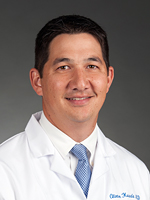<< Back
What is Head and Neck Cancer? Our Doctor Offers This Guide

November 11, 2020
By Dr. Clinton Kuwada
Co-Director, Head and Neck Cancer Program
Hartford HealthCare Cancer Institute
 Dr. Clinton Kuwada
Dr. Clinton Kuwada
Head and neck cancer accounts for about 4 percent of all cancers in the United States and is the eighth-most common cancer worldwide. Head and neck cancers more commonly affect men than women.
This year, an estimated 65,630 people (48,200 men and 17,430 women) will develop head and neck cancer. It’s estimated that 14,500 deaths (10,760 men and 3,740 women) from head and neck cancer will occur this year.
Head and neck cancer treated at the Hartford HealthCare Cancer Institute includes various malignant tumors that develop in or around the oral cavity, pharynx (throat), larynx (voice box), nasal cavity/sinuses, thyroid gland, salivary glands, lymph nodes and skin.
Causes
The two main risk factors are smoking and alcohol. Research has noted a decrease in oral cavity and laryngeal cancer since the 1980s, a decline that parallels the decrease in smoking. Unfortunately, research studies have also demonstrated a steady increase in oropharyngeal cancer over the past 30 years, which is directly related to the human papilloma virus (HPV).
HPV is now established as a major risk factor for developing oropharyngeal cancer and accounts for 70 percent to 80 percent of oropharyngeal cancer the United States. HPV is the most common sexually transmitted disease in the United States. It infects close to 80 million Americans, many in their late teens and 20s.
Treatment
The typical treatment for early-stage head and neck cancer (stage I or II) is either surgery or radiation alone. Typical treatment for late-stage head and neck cancer (stage III or IV) requires multimodality therapy, a combination of surgery, radiation and chemotherapy. Overall survival rates for localized, early-stage cancers can exceed 90 percent when involving tonsils, salivary glands and lips. But cancers involving the larynx or hypopharynx result in a poorer prognosis.
Hartford HealthCare has a designated head and neck cancer program with a multidisciplinary tumor board, where a consensus, personalized treatment plan is developed for each patient. The tumor board includes fellowship-trained head and neck surgical oncologists, radiation oncologists, medical oncologists, neuroradiologists, pathologists and speech language pathologists.
Our team members also offer a head and neck cancer multidisciplinary clinic for patients with a new head and neck cancer diagnosis. In our multidisciplinary clinic, you can be seen by physicians from each of the disciplines during a single afternoon visit, allowing them to develop a treatment recommendation within 24 hours.
Our team also includes dentists, oral surgeons, dietitians and others needed to help support patients and families during diagnosis, treatment and survivorship.
Surgery
Dr. Akshay Patel and I are Hartford HealthCare’s fellowship-trained head and neck surgical oncologists. We work together on a surgical plan to maximize oncologic outcomes while preserving key functions, such as speech and swallowing.
With advances in technology, many tumors can be removed with minimally invasive procedures. These include laser microsurgery, robotic approaches and endoscopic skull base surgery. Transoral robotic surgery (TORS) has allowed our head and neck surgical oncologists to safely and effectively remove cancers in the pharynx and larynx that previously required much more invasive approaches.
Still, some patients are best treated with traditional techniques. In these cases, head and neck cancer operations can be very complex and require careful preparation and planning. Often, our fellowship-trained head and neck surgical oncologists also perform simultaneous microvascular reconstructive surgery to optimize cosmesis (restoring or preserving physical appearance) and post-operative speech and swallowing function.
Radiation
Hartford HealthCare’s head and neck radiation oncologists use state-of-the-art radiation planning and technology, including intensity-modulated radiation therapy (IMRT), to restrict the radiation dose to the specific target and avoid or reduce exposure of healthy tissue. This helps to limit the side effects of treatment.
IMRT uses multiple small photon beams of varying intensities to precisely irradiate a tumor. The radiation intensity of each beam is controlled, and the beam shape changes throughout each treatment.
Immunotherapy
New advances in immunotherapy are providing improved success for patients with recurrent or metastatic head and neck cancer. Hartford HealthCare’s head and neck medical oncologists are expertly offering appropriate patients appropriately selected chemotherapy, immunotherapy and targeted therapy options. Through our alliance with Memorial Sloan Kettering Cancer Center, we offer a collaborative approach to treating patients with recurrent cancer when more conventional approaches have failed.
We realize that a diagnosis of head and neck cancer is extremely frightening and treatment options can be overwhelming. We offer a multidisciplinary approach to simplify and streamline your care. Our team involves the support of a head and neck cancer nurse navigator who will quarterback your care, coordinating appointments and guiding you through treatment.
Our support team includes speech language pathologists, dental medicine specialists, nutritionists, social workers, and psychiatrists. Our survivorship nurse navigator will formulate a survivorship care plan to help keep patients well.
Head and neck cancers are treatable and curable. Many survivors experience long-term treatment side effects. Our goals are to maximize your chances for a cure while minimizing side effects from treatments.
We also are focused on preserving or restoring our patients’ ability to swallow and speak. Our multidisciplinary team will closely work with our patients even after their treatment is complete for five years or more to support their survivorship and quality of life.
Our team works hard to develop special patient-physician relationship necessary to support cancer surveillance and survivorship.